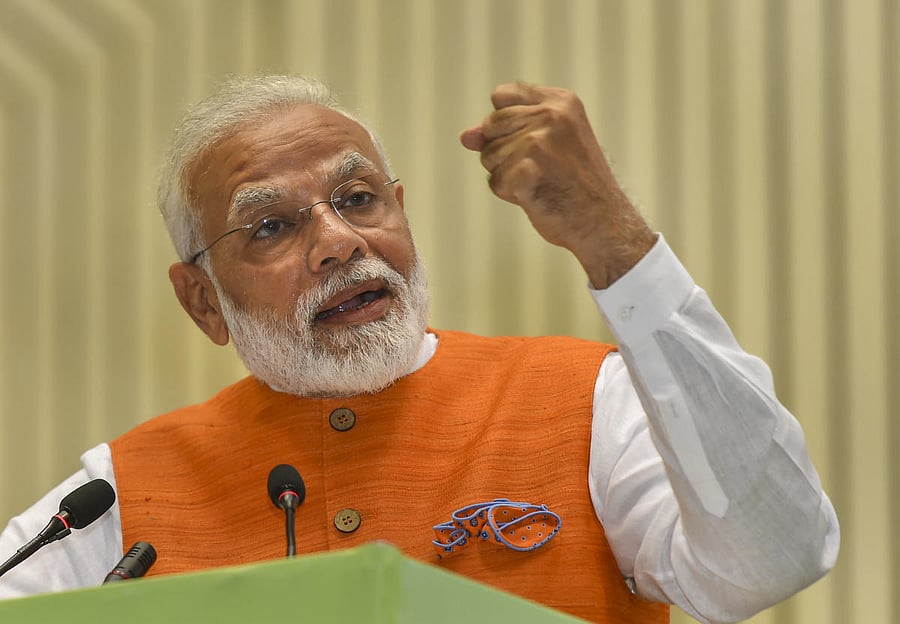
Prime Minister Narendra Modi on Friday said he welcomed "constructive criticism" and there should be enough space in public life for "differing streams" to listen to each other's point of view.
There should be continuous dialogue in society irrespective of differing views, the prime minister asserted.
People with differing views do not have to agree on everything but there must be "enough civility in public life for differing streams to be able to hear each other’s point of view...", he said.
He was addressing the Malayala Manorama News Conclave in Kochi via video link from the national capital.
"Here I am, at a forum where perhaps I do not have many whose thought process is similar to mine but there are enough thinking people whose constructive criticism is something I greatly look forward to," Modi told the gathering, which included several opposition and BJP leaders.
Information and Broadcasting Minister Prakash Javadekar, BJP's Meenakshi Lekhi, Congress' Shashi Tharoor, CPI general secretary D Raja, CPM's Mohammed Salim and Trinamool Congress' Mohua Moitra were among those present at the event.
Modi said his address at the conclave had generated "great curiosity".
It is usually believed that public figures prefer to be on forums whose thought process matches with the person’s own world view because there is a lot of comfort in being among such people, he said.
"Of course, I also cherish being among such surroundings but, at the same time, I believe there must be a constant and continuous dialogue between individuals and organisations irrespective of one’s thought process," he said.
The organisers, Modi pointed out, had selected 'New India' as the theme of the conclave.
"Critics will ask you -- are you also speaking the language of Modi ji now? I hope you have your answers ready for that," the prime minister said.
Referring to the "spirit of new India", Modi said a culture in which aspiration became a bad word was perpetrated for many years. Doors opened depending on ones surname or contacts.
"Success depended on whether you belonged to an old boy’s club. Big cities, big institutions and big families … this is all that mattered," the prime minister said.
The economic culture of "License Raj and Permit Raj struck at the heart of individual ambitions" but India was changing for the better, he stressed.
"This is an India where the surnames of the youth do not matter. What matters is their ability to make their own name," he said.
The prime minister referred to several changes in governance, saying they were earlier deemed "impossible".
"In a state like Haryana, it was not thinkable that recruitment for government jobs could be done transparently. But now people are talking about the transparent manner in which recruitment took place."
Earlier people asked whether they will be able to remove policy paralysis, but things had changed, Modi said.
"Today people say we will... the spirit has changed," he added.
Referring to the "citizen-centric governance" of his regime, he said over 1.5 crore homes for the poor have been constructed at a rapid pace.
"We were conscious of the fact that we were not creating houses, but were building homes. We needed to move away from the concept of merely constructing four walls. Our approach was deliver more facilities, deliver more value, deliver in less time and deliver at no extra cost," Modi said.
His government does not only care about people living in India, but diaspora settled abroad, he said.
"When Indian nurses were captured in different parts of West Asia, no stone was left unturned to bring them back home. The same spirit was seen when Father Tom, another son of Kerala, was captured," he said.
Father Tom Uzhunnalil was freed after being kept in captivity suspectedly by the ISIS for 18 months in strife-torn Yemen.
One of the highlights of his recent visit to Bahrain was that the Royal Family pardoned 250 Indians serving sentences there, he said. Similar pardons have been granted by Oman and Saudi Arabia, he said.
Addressing the gathering later, Javadekar said the BJP-led government at the Centre was committed to ensuring media freedom and recalled the party leaders' fight against Emergency in 1975 to protect press freedom.
"That commitment will remain today also and for ever to protect the freedom of media," the minister said while speaking on "New India: Government and Media" at the conclave in Kochi.
The minister said responsible freedom is the essence of a democratic society. He said responsible freedom does not mean regulated freedom but means being responsible while enjoying freedom.
Asserting that the government was committed to media freedom, freedom of expression and protests, he said, "That freedom is essence of democracy and we will ensure that a vibrant democracy wants all these freedom. That we will ensure."